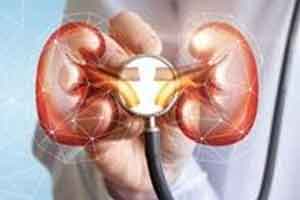- Home
- Editorial
- News
- Practice Guidelines
- Anesthesiology Guidelines
- Cancer Guidelines
- Cardiac Sciences Guidelines
- Critical Care Guidelines
- Dentistry Guidelines
- Dermatology Guidelines
- Diabetes and Endo Guidelines
- Diagnostics Guidelines
- ENT Guidelines
- Featured Practice Guidelines
- Gastroenterology Guidelines
- Geriatrics Guidelines
- Medicine Guidelines
- Nephrology Guidelines
- Neurosciences Guidelines
- Obs and Gynae Guidelines
- Ophthalmology Guidelines
- Orthopaedics Guidelines
- Paediatrics Guidelines
- Psychiatry Guidelines
- Pulmonology Guidelines
- Radiology Guidelines
- Surgery Guidelines
- Urology Guidelines
Antibiotic Combination Increases Acute Kidney Injury Risk In Hospitalised Children

Kevin J. Downes et al. in a multicenter cohort study evaluated association of combination of intravenous vancomycin plus piperacillin/tazobactam with the development of acute kidney injury in children.The aim was that Pediatricians must be cognizant of the potential added risk of this combination therapy when making empirical antibiotic choices.
In this the researchers included 1915 hospitalized children prescribed combination therapy, the concomitant administration of intravenous vancomycin plus piperacillin/tazobactam, compared with vancomycin plus other antipseudomonal β-lactam antibiotics, was significantly associated with an increased risk of acute kidney injury.
β-Lactam antibiotics are often coadministered with intravenous (IV) vancomycin hydrochloride for children with suspected serious infections. For adults, the combination of IV vancomycin plus piperacillin sodium/tazobactam sodium is associated with a higher risk of acute kidney injury (AKI) compared with vancomycin plus 1 other β-lactam antibiotic. However, few studies have evaluated the safety of this combination for children.
The researchers assessed the risk of AKI in children during concomitant therapy with vancomycin and 1 antipseudomonal β-lactam antibiotic throughout the first week of hospitalization.They focused on children hospitalized for 3 or more days who received IV vancomycin plus 1 other antipseudomonal β-lactam combination therapy at 1 of 6 large children’s hospitals from January 1, 2007, through December 31, 2012. The study used the Pediatric Health Information System Plus database, which contains administrative and laboratory data from 6 pediatric hospitals in the United States. Patients with underlying kidney disease or abnormal serum creatinine levels on hospital days 0 to 2 were among those excluded. Patients 6 months to 18 years of age who were admitted through the emergency department of the hospital were included. Data were collected from July 2015 to March 2016. Data analysis took place from April 2016 through July 2017. Acute kidney injury was defined using KDIGO criteria and was based on changes in serum creatinine level from hospital days 0 to 2 through hospital days 3 to 7.
It was found that among the cohort who received IV vancomycin plus 1 other antipseudomonal β-lactam antibiotic, 157 patients (8.2%) had antibiotic-associated AKI. This number included 117 of 1009 patients (11.7%) who received IV vancomycin plus piperacillin/tazobactam combination therapy. After adjustment for age, intensive care unit level of care, receipt of nephrotoxins, and hospital, IV vancomycin plus piperacillin/tazobactam combination therapy was associated with higher odds of AKI each hospital day compared with vancomycin plus 1 other antipseudomonal β-lactam antibiotic combination (adjusted odds ratio, 3.40; 95% CI, 2.26-5.14).
The researchers concluded that coadministration of IV vancomycin and piperacillin/tazobactam may increase the risk of AKI in hospitalized children. Pediatricians must be cognizant of the potential added risk of this combination therapy when making empirical antibiotic choices.
For more details click on the link: doi:10.1001/jamapediatrics.2017.3219
Next Story
NO DATA FOUND

Disclaimer: This site is primarily intended for healthcare professionals. Any content/information on this website does not replace the advice of medical and/or health professionals and should not be construed as medical/diagnostic advice/endorsement or prescription. Use of this site is subject to our terms of use, privacy policy, advertisement policy. © 2020 Minerva Medical Treatment Pvt Ltd